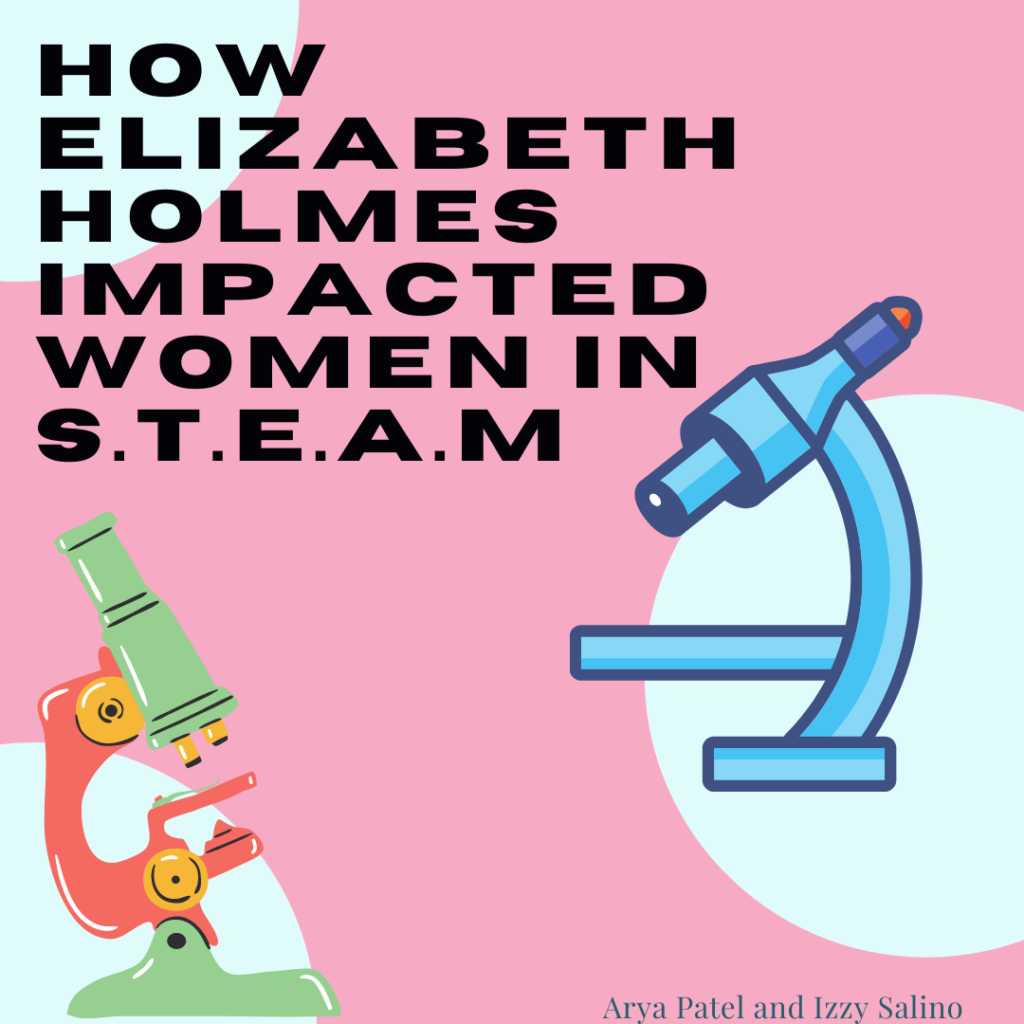By Izzy S. and Arya P.
Every single day, we are exposed to media that highly influence our perspectives on gender roles. A recent event that has really caught our attention was the Theranos scandal involving Elizabeth Holmes and Ramesh “Sunny” Balwani. This scandal was documented through the form of a docu-series that premiered on Hulu called “The Dropout”. The series gives an in-depth summary of the entire scandal from beginning to end. To lightly touch on the summary, Theranos was a highly recognized blood sampling company that claimed to only use “a few drops of blood” through the method of a finger prick to run over 100 tests in minutes. The company was released in the form of care centers in Walgreens all over Arizona and Silicon Valley. This was a highly complex and advanced idea. If executed correctly, this idea would have been a great one. But, due lack of background in medical experience, Elizabeth Holmes was not able to create what she had envisioned. Holmes failed to admit that her project was not working and continued with manufacturing, which in turn would begin a negative stereotype for all women in STEAM.
Although Holmes, CEO of Theranos, allowed the tests to be run, it would not be revealed until 2017 that the entire company was fraudulent, allowing over 1.5 million patients to inaccurate test results. It was announced through a paper in the Wallstreet Journal that Holmes had been using Siemens machines, another company’s blood-testing product, and labeling them as her own. These machines used full intravenous blood samples – tubes of blood, as opposed to the finger prick she had originally proposed. All of these factors furthered the nation’s distrust in Holmes, which would translate into the untrustworthy stereotype of women in STEAM.
Holmes only attended one and a half years of schooling through Stanford University. During her time at Stanford, she pitched the idea multiple times to members of the Board of Sciences at Stanford, one of them being female scientist and entrepreneur, Phyllis Gardner. Her idea was turned down by Gardner multiple times, but she went against her advice and pursued the start-up of Theranos anyway. This caused her to lack the credibility and knowledge she would need to correctly produce such a complex project. It was also revealed that Balwani, COO of the company, had been hiring extremely inexperienced employees to work in the labs, causing blood samples to be lost, broken, and diluted. This provided extremely inaccurate results to patients and caused a lot of people to believe that they were ill when they weren’t, or on the other hand, caused them to believe they were not ill when they really were.
“The Dropout” was able to demonstrate how the actions of Holmes, set back all women in the STEAM industry. Multiple times throughout the docu-series, the impact of Holmes on the women in STEAM was mentioned. For example, Holmes does an interview speaking on Theranos and how a female professor, Phyllis Gardner, turned down her idea. After the interview, Gardner is shown speaking to a fellow disbeliever in Theranos, and is quoted saying:
Do you know how many times I’ve been told, ‘I can’t do it’? The sexism I’ve faced has been so naked and ugly, it’s just taken my breath away. But she thinks I didn’t support her idea because she’s had it easier than me…because I’m jealous of her? I’ve supported women my whole career, and how many chances are women going to get to be the CEO of a major startup? She screws this up, and we all look bad. That’s the ugly truth and that it is unforgivable. (The Dropout, Season 1 Episode 6)
Holmes was known as one of the only young women CEOs of a major startup, commonly being called the “Steve Jobs of the STEAM industry”. Holmes had made it seem achievable for women to have a central role in the STEAM industry. She was someone that many women looked up to as an inspiration, as many women are not accepted as part of the STEAM community. Due to Holmes’ involvement in such a public scandal, all the work that she had done to progress women as a part of the STEAM community was immediately set back. Gardner’s quote implies that because this scandal was so extreme, women will no longer be trusted as a part of the STEAM industry, even with the correct experience and background knowledge. This is due to the fact that even though Holmes attended Stanford, and worked with credible people, she still was able to create a fake company behind the backs of her employees, and the world. Due to stereotypes, all women in STEAM would now be categorized as “frauds”, and set back in years of progress.
After the continuous progression of Theranos, Elizabeth Holmes was placed on the Harvard Medical School Board of Fellows along with Phyllis Gardner. At a meeting, Gardner confronted Holmes about how she believes women would be set back in the science industry because of her, saying, “When this becomes a scandal, because it will become a scandal, what do you think happens to all of the other women who want to start companies? Who do they go to? Who’s going to trust them?” This further elaborates on the idea that due to Holmes, no woman will be trusted in science. In many ways, Holmes created an even worse stereotype for women in science than existed prior to Theranos. Further, “The Dropout” demonstrates a crisis for women in the STEAM community that will persist for years to come. Women’s credibility will continue to plummet because of this scandal unless proven otherwise.
Elizabeth Holmes not only ruined a possibly great idea but also ruined the chances that women have to continue progressing in the STEAM industry. This is a major step back for all women working to change modern medicine, as well as all women working to become CEOs or create start-ups.

